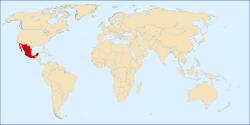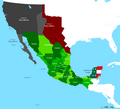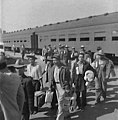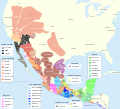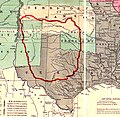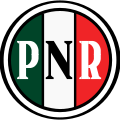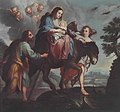Portal:Mexico
|
The Temple of Warriors at Chichen Itza, Mexico
¡Bienvenido! Welcome to the Mexico portal
Mexico, officially the United Mexican States, is a country in the southern portion of North America. It covers 1,972,550 km2 (761,610 sq mi), making it the world's 13th-largest country by area; with a population of almost 130 million, it is the 10th-most-populous country and the most populous Spanish-speaking country. Mexico is organized as a federal constitutional republic comprising 31 states and Mexico City, its capital. It shares land borders with the United States to the north, with Guatemala and Belize to the southeast; as well as maritime borders with the Pacific Ocean to the west, the Caribbean Sea to the southeast, and the Gulf of Mexico to the east.
This is a Featured article, which represents some of the best content on English Wikipedia.
Segundo Romance (English: Second Romance) is the tenth studio album by Mexican singer Luis Miguel, released on 30 August 1994 through WEA Latina. Like Miguel's 1991 album Romance, Segundo Romance comprises cover versions of boleros (Latin ballads) written between 1934 and 1993. It was produced by Miguel with Juan Carlos Calderón, Kiko Cibrian and Armando Manzanero and recorded in early 1994 at the Record Plant in Los Angeles. Miguel promoted the album with tours in the United States and Latin America from August to December 1994. Four singles were released: "El Día Que Me Quieras", "La Media Vuelta", "Todo y Nada", and "Delirio". The former two reached the top of the Billboard Hot Latin Songs chart in the United States. (Full article...)Selected article - The National Autonomous University of Mexico (Spanish: Universidad Nacional Autónoma de México, UNAM) is a public research university in Mexico. It has several campuses in Mexico City, and many others in various locations across Mexico, as well as a presence in nine countries. It also has 34 research institutes, 26 museums, and 18 historic sites. A portion of Ciudad Universitaria (University City), UNAM's main campus in Mexico City, is a UNESCO World Heritage site that was designed and decorated by some of Mexico's best-known architects and painters. The campus hosted the main events of the 1968 Summer Olympics, and was the birthplace of the student movement of 1968. All Mexican Nobel laureates were either alumni or faculty of UNAM. In 2009, the university was awarded the Prince of Asturias Award for Communication and Humanities. More than 25% of the total scientific papers published by Mexican academics come from researchers at UNAM. (Full article...)Selected picture Bodegón con frutas (con alacrán y rana) (English: Still life with fruit (with scorpion and frog)) (1874), Hermenegildo Bustos, Museo Nacional de Arte image credit: public domain
This is a Good article, an article that meets a core set of high editorial standards.
Unomásuno (English: One Plus One) is a Mexican daily tabloid newspaper circulated in Mexico City. Formed in 1977 by former employees of Mexico City's daily newspaper Excélsior, it became one of the leading leftist newspapers in Mexico during the late 1970s and early 1980s. The newspaper covered investigative topics that were often avoided by the rest of the Mexican press at the time, and it was a harsh critic of the Mexican government. By the mid-1980s, disagreements over the newspaper's management style led to internal divisions. Those who disagreed with Unomásuno and its future initiatives left in 1984 and formed La Jornada, another leftist daily in Mexico City. In the late 1980s, Unomásuno was a victim of a backlash from the Mexican government for publishing articles highlighting a growing opposition faction within Mexico's dominant political party, the Institutional Revolutionary Party (PRI). Its founder was threatened with prison for tax evasion, and the newspaper was forced to pay hefty fines. In 1989, its founder sold the newspaper to a PRI-affiliated businessman. Under the new ownership, Unomásuno became a propaganda organ for the PRI and published articles criticizing leftist opposition groups. Its circulation declined drastically over the years, and although Unomásuno was resold in 1998, it continued to experience financial difficulties. (Full article...)Selected biography -Don Miguel Gregorio Antonio Ignacio Hidalgo y Costilla Gallaga Mandarte y Villaseñor (8 May 1753 – 30 July 1811), more commonly known as Miguel Hidalgo y Costilla or Miguel Hidalgo (Spanish pronunciation: [miˈɣel iˈðalɣo]), was a Catholic priest, leader of the Mexican War of Independence and recognized as the Father of the Nation. A professor at the Colegio de San Nicolás Obispo in Valladolid, Hidalgo was influenced by Enlightenment ideas, which contributed to his ouster in 1792. He served in a church in Colima and then in Dolores. After his arrival, he was shocked by the rich soil he had found. He tried to help the poor by showing them how to grow olives and grapes, but in New Spain (modern Mexico) growing these crops was discouraged or prohibited by colonial authorities to prevent competition with imports from Spain. On 16 September 1810 he gave the Cry of Dolores, a speech calling upon the people to protect the interest of their King Ferdinand VII, held captive during the Peninsular War, by revolting against the European-born Spaniards who had overthrown the Spanish Viceroy José de Iturrigaray. (Full article...)
In the news
Selected fare or cuisine -Tostilocos (also Dorilocos) are a popular Mexican antojito (street food) that consist of a varied mix of ingredients that usually includes Tostitos or Doritos tortilla chips, topped with cueritos (pickled pork rinds), cucumber, jícama, lime juice, hot sauce, chamoy, chili powder, salt, and "Japanese peanuts" (sometimes referred to as "cracker nuts"). The dish was first conceived in the late 1990s by street vendors in Mexico. In the 21st century, Tostilocos are now commonly sold by street vendors, stadium vendors, and at Mexican juice bars in both Mexico and the Southwestern United States. (Full article...)
General imagesThe following are images from various Mexico-related articles on Wikipedia.
CategoriesTopicsRelated portalsWikiProjectYou are invited to participate in WikiProject Mexico, a WikiProject dedicated to developing and improving articles about Mexico. Associated WikimediaMore portals | ||||||||||




